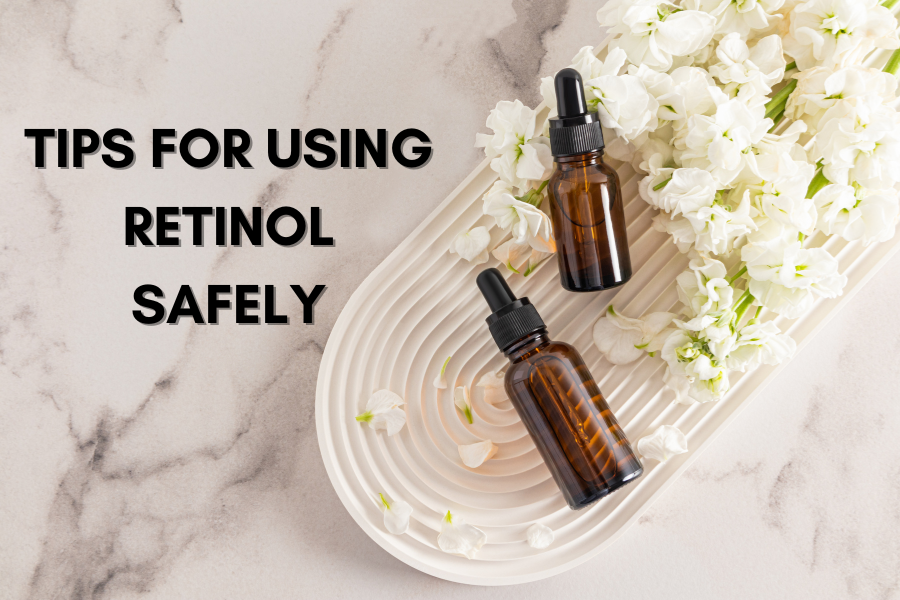If you’ve ever looked into skincare for anti-aging, acne or glowing skin, you’ve probably heard about retinol. This vitamin A derivative is one of the most talked-about ingredients in skincare. It is known for its ability to improve skin texture, reduce wrinkles and clear breakouts. But what makes retinol so effective, and how can it transform your skin? Let’s dive in and find out.
What is retinol?
Retinol is a form of vitamin A and one of the most widely recognized ingredients in skincare. It belongs to a family of compounds called retinoids, which are known for their powerful effects on skin health. Retinol works at a cellular level, promoting skin renewal, increasing collagen production, and addressing various concerns like acne, fine lines, wrinkles, and uneven skin tone. Unlike prescription-strength retinoids like tretinoin, retinol is milder and available over-the-counter, making it accessible for most skincare routines.

Benefits of retinol for your skin
1. Reduces Fine Lines and Wrinkles
Retinol is well-known for its anti-aging properties. It stimulates collagen and elastin production, the proteins responsible for skin’s structure and firmness. Over time, this reduces the appearance of fine lines and wrinkles, leaving skin looking youthful and smooth.
2. Brightens Dull Complexion
If your skin is looking tired or dull, retinol can help. It promotes cell turnover, shedding dead skin cells and revealing fresher, more radiant skin.
3. Clears Acne and Prevents Breakouts
Retinol is a powerful solution for acne-prone skin. It unclogs pores, reduces excess oil and calms inflammation, helping to heal current breakouts while preventing new ones from forming.
4. Fades Dark Spots and Hyperpigmentation
Retinol works wonders on dark spots, acne marks and hyperpigmentation. By promoting skin renewal, it fades discoloration and evens out skin tone, leaving you with a clearer, more uniform complexion.
5. Smooths Skin Texture
Rough patches and uneven texture can be improved with retinol. Its exfoliating properties refine the skin’s surface, leaving it soft and smooth.
6. Prevents Premature Aging
Retinol isn’t just about treating existing concerns, it’s also great for prevention. Its antioxidant properties combat free radicals and reduce oxidative stress, shielding your skin from environmental damage and keeping it healthier for the long term.

Tips for Using Retinol Safely
While retinol offers incredible benefits, it’s important to use it correctly to avoid irritation:
• Start Slow: Use retinol once or twice a week to allow your skin to adjust. Gradually increase usage as tolerated.
• Apply at Night: Retinol can make your skin more sensitive to the sun, so it’s best used as part of your evening routine.
• Use Adequate Sunscreen: Retinol can make your skin more sensitive to the sun, so always apply a broad-spectrum SPF during the day.
• Moisturize: To counteract dryness, pair retinol with a hydrating moisturizer.
• Choose the Right Strength: If you’re new to retinol, start with a lower concentration (0.25%–0.5%) before moving to higher strengths.
Who Can Benefit from Retinol?
Retinol is suitable for most skin types and can address a wide range of concerns. However, individuals with highly sensitive skin, eczema or rosacea should consult a dermatologist before starting retinol. Pregnant or breastfeeding individuals should avoid it due to potential risks.
Conclusion
In conclusion, retinol is a highly effective ingredient that can transform your skin, offering benefits like smoother texture, reduced wrinkles, and a brighter complexion. With proper use, it can be a valuable addition to any skincare routine.
Author: Dr Lim Xin Ying, 22 Nov 2024

